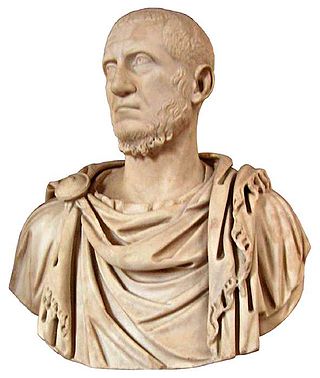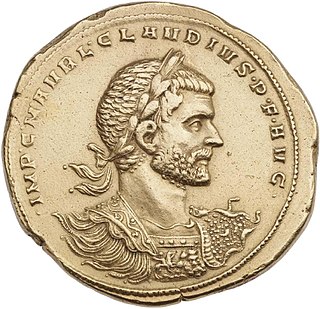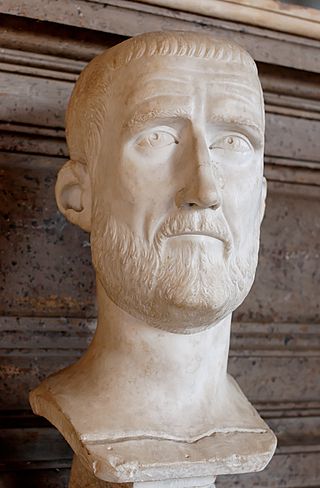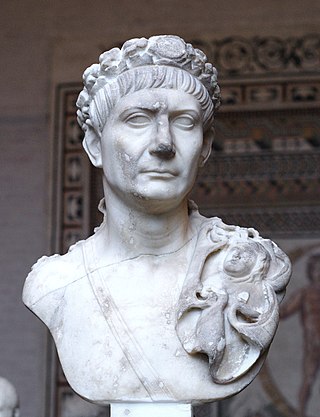Aurelian was Roman emperor from 270 to 275.
Aurelian may also refer to:

Marcus Claudius Tacitus was Roman emperor from 275 to 276. During his short reign he campaigned against the Goths and the Heruli, for which he received the title Gothicus Maximus.

Marcus Aurelius Antoninus was Roman emperor from 161 to 180 and a Stoic philosopher. He was a member of the Nerva–Antonine dynasty, the last of the rulers later known as the Five Good Emperors and the last emperor of the Pax Romana, an age of relative peace, calm, and stability for the Roman Empire lasting from 27 BC to 180 AD. He served as Roman consul in 140, 145, and 161.

Septimia Zenobia was a third-century queen of the Palmyrene Empire in Syria. Many legends surround her ancestry; she was probably not a commoner, and she married the ruler of the city, Odaenathus. Her husband became king in 260, elevating Palmyra to supreme power in the Near East by defeating the Sasanian Empire of Persia and stabilizing the Roman East. After Odaenathus' assassination, Zenobia became the regent of her son Vaballathus and held de facto power throughout his reign.

Aurelian was a Roman emperor who reigned from 270 to 275 during the Crisis of the Third Century. As emperor, he won an unprecedented series of military victories which reunited the Roman Empire after it had nearly disintegrated under the pressure of barbarian invasions and internal revolts. Born in modest circumstances, most likely in Moesia Superior, he entered the Roman army in 235 and climbed up the ranks. He went on to lead the cavalry of the emperor Gallienus, until Gallienus' assassination in 268. Following that, Claudius Gothicus became emperor until his own death in 270. Claudius' brother Quintillus then ruled for three months, before Aurelian took the empire for himself.

Marcus Aurelius Claudius "Gothicus", also known as Claudius II, was Roman emperor from 268 to 270. During his reign he fought successfully against the Alemanni and decisively defeated the Goths at the Battle of Naissus. He died after succumbing to a "pestilence", possibly the Plague of Cyprian that had ravaged the provinces of the Empire.

Marcus Aurelius Probus was Roman emperor from 276 to 282. Probus was an active and successful general as well as a conscientious administrator, and in his reign of six years he secured prosperity for the inner provinces while withstanding repeated invasions of barbarian tribes on almost every sector of the frontier.

The Gallic Empire or the Gallic Roman Empire are names used in modern historiography for a breakaway part of the Roman Empire that functioned de facto as a separate state from 260 to 274. It originated during the Crisis of the Third Century, when a series of Roman military leaders and aristocrats declared themselves emperors and took control of Gaul and adjacent provinces without attempting to conquer Italy or otherwise seize the central Roman administrative apparatus.

Gaius Pius Esuvius Tetricus was a Gallo-Roman nobleman who ruled as emperor of the Gallic Empire from 271 to 274 AD. He was originally the praeses of Gallia Aquitania and became emperor after the murder of Emperor Victorinus in 271, with the support of Victorinus's mother, Victoria. During his reign, he faced external pressure from Germanic raiders, who pillaged the eastern and northern parts of his empire, and the Roman Empire, from which the Gallic Empire had seceded. He also faced increasing internal pressure, which led him to declare his son, Tetricus II, caesar in 273 and possibly co-emperor in 274, although this is debated. The Roman emperor Aurelian invaded in 273 or 274, leading to the Battle of Châlons, at which Tetricus surrendered. Whether this capitulation was the result of a secret agreement between Tetricus and Aurelian or that surrender was necessary after his defeat is debated. Aurelian spared Tetricus, and made him a senator and the corrector (governor) of Lucania et Bruttium. Tetricus died of natural causes a few years after 274.

Sirmium was a city in the Roman province of Pannonia, located on the Sava river, on the site of modern Sremska Mitrovica in the Vojvodina autonomous province of Serbia. First mentioned in the 4th century BC and originally inhabited by Illyrians and Celts, it was conquered by the Romans in the 1st century BC and subsequently became the capital of the Roman province of Pannonia Inferior. In 293 AD, Sirmium was proclaimed one of the four capitals of the Roman Empire. It was also the capital of the Praetorian prefecture of Illyricum and of Pannonia Secunda. The site is protected as an archaeological Site of Exceptional Importance. The modern region of Syrmia was named after the city.

Septimius Vaballathus was emperor of the Palmyrene Empire centred at Palmyra in the region of Syria. He came to power as a child under his regent mother Zenobia, who led a revolt against the Roman Empire and formed the independent Palmyrene Empire.
Claudius was the fourth Roman Emperor, reigning from AD 41 to his death.

The Palmyrene Empire was a short-lived breakaway state from the Roman Empire resulting from the Crisis of the Third Century. Named after its capital city, Palmyra, it encompassed the Roman provinces of Syria Palaestina, Arabia Petraea, and Egypt, as well as large parts of Asia Minor.

Aurelian "Grizzly" Smith was an American professional wrestler. He was the father of professional wrestlers Jake "The Snake" Roberts, Rockin' Robin, and Sam Houston.

Dacia Ripensis was the name of a Roman province in the northern Balkan peninsula, immediately south of the Middle Danube. Its capital was Ratiaria. It was a district less urban than neighbouring Dacia Mediterranea and more militarized; "military camps and forts, rather than cities, were typical of the province". Besides Ratiaria, Oescus was the major settlement.
Julius Placidianus was a Roman general of the 3rd century. He was a professional soldier who advanced his career under Gallienus and survived into the age of Claudius II and Aurelian. Placidianus was consul in the year 273 as the posterior colleague of Marcus Claudius Tacitus, the future emperor. His life presented here is largely derived from L.L. Howe's history of the Praetorian Prefecture.
Faustinus was a 3rd-century CE political figure who launched a rebellion against the Gallic Emperor Tetricus I. His full name and his year of birth are unknown. According to a small number of literary sources, Faustinus sparked a mutiny among Tetricus' troops. At the time of his rebellion, Faustinus was a provincial governor (praeses), presumably of Gallia Belgica since the capital of that province—Augusta Treverorum—was where the rebellion began. Faustinus' revolt was formidable enough, according to the literary sources, to lead Tetricus to appeal to the central Roman emperor Aurelian for aid against the usurper.
Aurelius may refer to members of the ancient Roman plebeian family Aurelia gens, especially Emperor Marcus Aurelius.

The gens Ulpia was a Roman family that rose to prominence during the first century AD. The gens is best known from the emperor Marcus Ulpius Trajanus, who reigned from AD 98 to 117. The Thirtieth Legion took its name, Ulpia, in his honor. The city of Serdica, modern day Sofia, was renamed as Ulpia Serdica.
Aurelius/Iulius Marcellinus was a Roman soldier and Imperial functionary who had a brilliant equestrian career and was elevated to the Senate when he was chosen by the Emperor Aurelian as his consular colleague. His appointment as Consul is thought to have been a reward for his loyalty and steadfastness in 273 when, as Aurelian's deputy in charge of the eastern provinces of the Empire where the authority of the Imperial Government had only recently been restored, he resisted attempts to suborn him by a rebellious faction in the city of Palmyra.
Aurelianus may refer to: